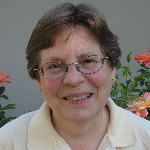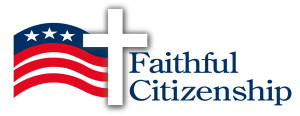- Featured Favorites
Voting Our Conscience
by Carol Hogan
Elections are upon us, and with so many issues to be decided, fulfilling our civic responsibility can be a daunting task.
I would like to examine our civic responsibility, voting your conscience, as well as conscience in the public arena—from my perspective.
For the past 23 years, I have been a staff member of the California Catholic Conference, the Sacramento-based public policy office of the state’s Catholic bishops. In my work, I am called upon to follow current public policy debates in order to write and speak about them to both legislators and Catholics. I am also charged with being a resource to and liaison for respect life, family life, post-abortion healing, and NFP directors and coordinators from Catholic dioceses throughout California.
What follows are several insights; some of which will come from Forming Consciences for Faithful Citizenship, the U.S. Catholic Bishops quadrennial teaching document, in which they urge American Catholics to take both their faith and their citizenship seriously, and some from my experience as a director for the California Catholic Conference.
In Forming Consciences (available at www.usccb.org) the United States Catholic bishops remind us that Catholics have the same rights and duties as others to participate fully in public life. The bishops do not tell Catholics for whom they should vote, but they do speak out on the issues of our day, which actually are timeless. What are those issues? Here, in their own words, is what they say:
“We are members of a community of faith with a long tradition of teaching and action on human life and dignity, marriage and family, justice and peace, care for creation, and the common good. As Americans, we are also blessed with religious liberty, which safeguards our right to bring our principles and moral convictions into the public arena.”
As people of faith, we must form our consciences by informing our minds and our hearts. Not only should we gather information about current events and public policy disputes, but we should read and pray about the teachings of our faith. And with a well-formed conscience, we can then make prudential judgments when we vote—not only on issues but on candidates.
Let me do a brief overview of those “timeless” issues.
Life and dignity of the human person
The political questions regarding abortion, assisted suicide or euthanasia, embryonic stem cell research and capital punishment are all moral issues which are beautifully enveloped in the teaching of Pope John Paul II in his 1995 encyclical, Evangelium Vitae:
“The Church knows that this Gospel of life, which she has received from her Lord, has a profound and persuasive echo in the heart of every person—believer and non-believer alike—because it marvelously fulfills all the heart’s expectations while infinitely surpassing them. Even in the midst of difficulties and uncertainties, every person sincerely open to truth and goodness can, by the light of reason and the hidden action of grace, come to recognize in the natural law written in the heart (cf. Rom 2:14-15) the sacred value of human life from its very beginning until its end, and can affirm the right of every human being to have this primary good respected to the highest degree. Upon the recognition of this right, every human community and the political community itself are founded.”
Decisions on these political issues become clear-cut for a believer or a non-believer who is sincerely open to truth and goodness.
Marriage and family
“Same-sex marriage,” “gay” adoption, contraception, and IVF are in the news almost daily. If all these contentious political issues are viewed through the eyes of children, much of the clutter can be removed. What is best for children is to be conceived, born and raised in an intact family of their biological mother and father. Any other arrangement is not the best and ought not be either encouraged by government or sought by adults seeking their own “fulfillment.” Of course, the best is not always possible—and we laud single parents, grandparents and others who help raise children in need of loving care.
At the U.S. Catholic bishops’ website www.marriageuniqueforareason.org we find:
“Based on God’s revelation in Scripture and the meaning of the human person, created male and female in the image of God (Mt. 4-6, Gen 1:27), the Catholic Church teaches that marriage is the lifelong partnership of mutual and exclusive fidelity between a man and a woman ordered by its very nature to the good of the spouses and the procreation and education of children. At the heart of married love is the total gift of self that husband and wife freely offer to each other. Because of their sexual difference, husband and wife can truly become “one flesh” and can give to each other “the reality of children, who are a living reflection of their love. (Promulgated in Familiaris Consortio, Catechism of the Catholic Church and Gaudium et spes.)”
Decisions on these political issues must be based on an understanding of creation, biological complementarity, procreation and what advances human thriving.
Justice and Peace / Social Justice
Within the broader outlines of the concept of justice, the Catholic Church teaches us about social justice—which has been widely misunderstood in the secular world. Social justice includes the right of workers to choose whether or not to organize, just wages, economic freedom and the right to private property. Social justice embraces welfare policies that reduce poverty and dependence, strengthen family life and help families leave poverty through work. Social justice includes both the concepts of subsidiarity—that local communities ought (as far as possible) to solve their own problems—and that of solidarity in recognition of the fact that we need each other and ought to hold each other up especially—as Jesus instructed—those who are the least among us. In other words, government-provided solutions to societal problems ought to be the last resort—not the first one.
Care for Creation and the Common Good
Stewardship is the teaching of the Catholic Church which impacts not only our own lives, but that of our family, our community, our nation and the very earth itself. We are called to use only what we need, so as to not compromise the ability of future generations to meet their own needs. We can all see the lack of stewardship in the accumulated debts of governments and the misuse of our natural resources. We ought to evaluate both candidates and issues by considering their impact on the present—our common good—and the future.
Religious Liberty
As Americans and as Californians, we are guaranteed our natural right to freedom of religion—in our country’s and our state’s constitutions. Unfortunately, in our “post-modern” world, where natural law is subordinated to legal theories supporting currently fashionable ideologies, our religious liberty as individuals and religious institutions has been jeopardized. The most recent assault has been the U.S. Department of Health and Human Services (HHS) mandate that all health insurance include contraceptive coverage—with no exemption for those who have religious objections. While the Catholic bishops are calling upon the faithful to form their consciences, our government has usurped that function on certain teachings of the Catholic Church. As you may know, the US Catholic bishops as a body have rejected this intrusion, have spoken out loudly, filed multiple lawsuits, and are even contemplating civil disobedience if the issue is not resolved.
Conclusion
Several years ago, the California Catholic Conference launched a Catholic Legislative Network (CLN), which has as its charge the provision of information to its membership about current public policy issues, reflections on Catholic teaching germane to those issues, and the opportunity for the members to contact their legislators in order to influence public policy. There are currently more than 110,000 CLN members, who this calendar year sent tens of thousands of emails to government officials and placed hundreds of phone calls.
Our California ballot this year is a crowded affair with many candidates vying for state and national office as well as 11 state propositions. With the advent of the internet, you can readily access information on candidate’s stances and voting records. In addition, for your convenience, the California Catholic Conference has extensive materials on our website, www.cacatholic.org, providing brief summaries and relevant Catholic teachings on the 11 propositions. Please note that the bishops of the California Catholic Conference are supporting both Proposition 34, which will replace the death penalty with the sentence of life imprisonment without the possibility of parole, and Proposition 35, which will enhance penalties against human traffickers.
Let me conclude by urging you to become a CLN member. I believe that it will enhance your life, expand your knowledge and help your form your conscience. [learn_more caption=”Join Catholic Legislative Network”] To become a Catholic Legislative Network (CLN) member, go to www.cacatholic.org and click on the logo on the left side of the page to join![/learn_more]
And, please vote—after you actively “form your conscience” both on the issues and the candidates.
About The Author



